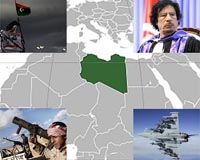| . |  |
. |
Brussels (AFP) March 21, 2011 NATO struggled Monday to overcome divisions about a role in the military operation in Libya, as France resisted pressure to let the alliance take over and Turkey criticised the bombing campaign. As more nations joined a Western coalition pounding Moamer Kadhafi's forces, NATO was still debating whether, and in what form, the Western military organisation should join the UN-mandated intervention. NATO members France, Britain and the United States have acted as individual nations in the air and sea campaign against Kadhafi's regime, with US military officers coordinating operations from bases in Germany and Italy. But London, Rome and several other alliance members favour moving to a centralised NATO command, with Norway even saying its six fighter jets would stay grounded as long as it was unclear who was running the operations. US President Barack Obama said he expected NATO to get involved in a "coordinating function" in the next phase of the operation within days. "As I said, our initial focus is taking out Libyan air defenses so that a no-fly zone can operate effectively and aircraft and pilots of the coalition are not threatened when they're maintaining the no-fly zone," he said during a visit in Chile. "The second aspect of this is making sure that the humanitarian aspects of the mission can be met. But let me emphasize that we anticipate this transition to take place in a matter of days and not a matter of weeks." Several NATO members insist that the alliance is the best vehicle to steer the complex operations in Libya, which involve warplanes and warships scattered across Mediterranean bases. Italian Prime Minister Silvio Berlusconi said NATO should take command of the international military operations. "We want command of the operations to go to NATO and that there be a different coordination to the one that currently exists," Italian news agencies quoted him as saying. Berlusconi also said that Italian planes "are not firing and will not fire", and are limited to patrolling to ensure a no-fly zone imposed by the United Nations. "It is essential for us to clearly define the objectives of the mission in Libya in the framework of the UN resolution: a no-fly zone, the imposition of the embargo and the protection of civilians," Berlusconi said. "All members of the coalition need to know what each are up to and NATO has experience in that," his Foreign Minister Franco Frattini told reporters after talks with EU counterparts in Brussels. Frattini warned that if NATO did not take over quickly, Italy could take back control of the bases used by the coalition on its territory. French Foreign Minister Alain Juppe indicated that NATO could "come in support" of the international campaign "within a few days", signalling a back-up role for the alliance rather than the lead. France, whose fighter jets launched the first salvos in the campaign against Kadhafi on Saturday, has resisted handing the baton to NATO in Libya, fearing a backlash from Arab nations that it wants to bring into the campaign. "Many countries that urge us to conduct operations under the NATO flag tell us to take Arab nations into account, but Arab nations do not want an operation under the NATO flag," Juppe said. A European diplomat said France was "completely isolated" in its position. But Germany and Turkey have voiced their own misgivings about NATO's involvement, albeit for different reasons than France. Germany, which abstained in the Security Council vote when the resolution was passed on Thursday, said initial criticism of the strikes by the Arab League's chief showed that Berlin had been right to fear military intervention. Turkish Foreign Minister Ahmet Davutoglu criticised the Western strikes and said the way the coalition was formed did not "sufficiently" observe legal procedures. He said the international community's objective should not be "to launch a large-scale war" similar to those in Afghanistan and Iraq. NATO envoys endorsed contingency plans for humanitarian aid operations and enforcing an arms embargo after marathon talks on Sunday, but failed to take a stand on the no-fly zone. Turkey effectively delayed a decision when it called for a review of NATO's no-fly zone plans, stressing that civilians must be protected as the alliance mulled its role, NATO diplomats said. The ambassadors held a new round of "very difficult" talks Monday and were likely to resume their deliberations on Tuesday, NATO officials said.
Share This Article With Planet Earth
Related Links
 UN Security Council opens new Libya session
UN Security Council opens new Libya sessionUnited Nations March 21, 2011 The UN Security Council began a closed-door meeting on Libya Monday, diplomats said, amid rising international criticism of air strikes directed at the regime of Moamer Kadhafi. Missile and air strikes launched over the weekend by US, British and French forces targeted Libyan air defense systems to impose a no-fly zone on Kadhafi's forces, and on Sunday demolished a building in the Libyan le ... read more |
|
| The content herein, unless otherwise known to be public domain, are Copyright 1995-2010 - SpaceDaily. AFP and UPI Wire Stories are copyright Agence France-Presse and United Press International. ESA Portal Reports are copyright European Space Agency. All NASA sourced material is public domain. Additional copyrights may apply in whole or part to other bona fide parties. Advertising does not imply endorsement,agreement or approval of any opinions, statements or information provided by SpaceDaily on any Web page published or hosted by SpaceDaily. Privacy Statement |